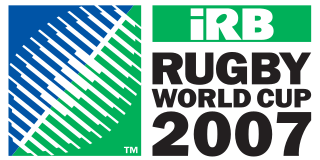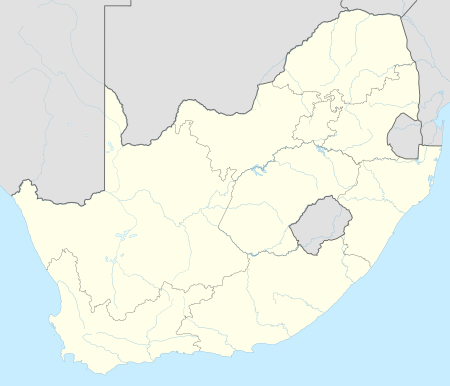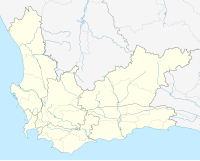The 1999 Rugby World Cup was the fourth Rugby World Cup, the quadrennial international rugby union championship. It was principally hosted by Wales, and was won by Australia. This was the first Rugby World Cup to be held in the sport's professional era.

The 2007 Rugby World Cup was the sixth Rugby World Cup, a quadrennial international rugby union competition inaugurated in 1987. Twenty nations competed for the Webb Ellis Cup in the tournament, which was hosted by France from 7 September to 20 October. France won the hosting rights in 2003, beating a bid from England. The competition consisted of 48 matches over 44 days; 42 matches were played in ten cities throughout France, as well as four in Cardiff, Wales, and two in Edinburgh, Scotland.
The 1995 Rugby World Cup was the third Rugby World Cup. It was hosted and won by South Africa, and was the first Rugby World Cup in which every match was held in one country.
The 2007 Africa Cup was the eighth edition of highest level rugby union tournament in Africa. The competition involved twelve teams that were divided into two zones. Each zone was then divided into two pools of three. Each pool winner then qualified for a semi-final; the semi-final winners then played each other in the final.
The 2008-2009 Africa Cup is the ninth edition of highest level rugby union tournament in Africa. The competition involves twelve teams that are divided into two zones. Each zone is then divided into two pools of three. Each pool winner then qualifies for a semi-final; the semi-final winners then play each other in the final.

The British and Irish Cup was an annual rugby union competition for second tier, semi-professional clubs and the reserves or developing teams from professional clubs from Great Britain and Ireland. It took place for the first time in the 2009–10 season.

The Africa Women's Sevens is the continental championship for women's international rugby sevens in Africa. The tournament sanctioned and sponsored by Rugby Africa which is the rugby union governing body for the continent.
The 2013 Varsity Cup was contested from 4 February to 8 April 2013. The tournament was the sixth season of the Varsity Cup, an annual inter-university rugby union competition featuring eight South African universities.

The Gold Cup is the premier rugby union club competition in South Africa for non-university teams.
The 2013 SARU Community Cup was the first season of the SARU Community Cup competition and was contested from 16 February to 1 April 2013. The tournament is the top competition for non-university rugby union clubs in South Africa.
The 2014 SARU Community Cup was the second season of the SARU Community Cup competition. The qualification to the tournament took place in 2013, while the competition proper was contested in 2014. The tournament is the top competition for non-university rugby union clubs in South Africa.
The 2016 Gold Cup was the fourth season of the Gold Cup competition, but the first season that it was known as the Gold Cup, having previously been known as the Community Cup. The tournament was the top competition for non-university rugby union clubs in South Africa, Namibia and Zimbabwe.
The 2015–16 European Rugby Challenge Cup was the second edition of the European Rugby Challenge Cup, an annual pan-European rugby union competition for professional clubs. It is also the 20th season of the Challenge Cup competition in all forms, following on from the now defunct European Challenge Cup. Due to the 2015 Rugby World Cup taking place during September and October 2015, the competition began slightly later than usual, with the first round of the group stage, on the weekend of 12/13/14/15 November 2015, and ended with the final on 13 May 2016 in Lyon.
The 2015–16 European Rugby Champions Cup was the second European Rugby Champions Cup championship, the annual rugby union club competition for teams from the top six nations in European rugby. The European Rugby Champions Cup replaced the Heineken Cup, which was Europe's top-tier competition for rugby clubs for the first nineteen years of professional European rugby union.
The 2016–17 European Rugby Champions Cup was the third European Rugby Champions Cup championship, the annual rugby union club competition for teams from the top six nations in European rugby. The competition replaced the Heineken Cup, which was Europe's top-tier competition for rugby clubs for the first nineteen years of professional European rugby union. The opening round of the tournament took place on the weekend of 14/15/16 October 2016. The final took place on 13 May 2017 at Murrayfield in Edinburgh.
The 2016–17 European Rugby Challenge Cup was the third edition of the European Rugby Challenge Cup, an annual second-tier rugby union competition for professional clubs. Clubs from six European nations plus one Russian club competed. It was also the 21st season of the Challenge Cup competition in all forms, following on from the now defunct European Challenge Cup.
The 2017–18 European Rugby Champions Cup was the fourth European Rugby Champions Cup championship, the annual rugby union club competition for teams from the top six nations in European rugby and was the twenty-third season of pan-European professional club rugby competition.
The 2017–18 European Rugby Challenge Cup was the fourth edition of the European Rugby Challenge Cup, an annual second-tier rugby union competition for professional clubs. It was also the 22nd season of the Challenge Cup competition in all forms, following on from the now defunct European Challenge Cup. Clubs from six European nations plus two Russian club will competed for the title.
The 2018–19 European Rugby Challenge Cup is the fifth edition of the European Rugby Challenge Cup, an annual second-tier rugby union competition for professional clubs. Including the predecessor competition, the original European Challenge Cup, this is the 23rd edition of European club rugby's second-tier competition. Clubs from five of the nations that participate in the Six Nations Championship, with Scotland as the only exception, plus Romania and Russia are competing.
The 2018–19 European Rugby Champions Cup is the fifth season of the European Rugby Champions Cup, the annual club rugby union competition run by European Professional Club Rugby (ECPR) for teams from the top six nations in Europe. It is the 24th season of pan-European professional club rugby competition. This competition will be the first to be sponsored by Heineken since the 2013–14 season.











